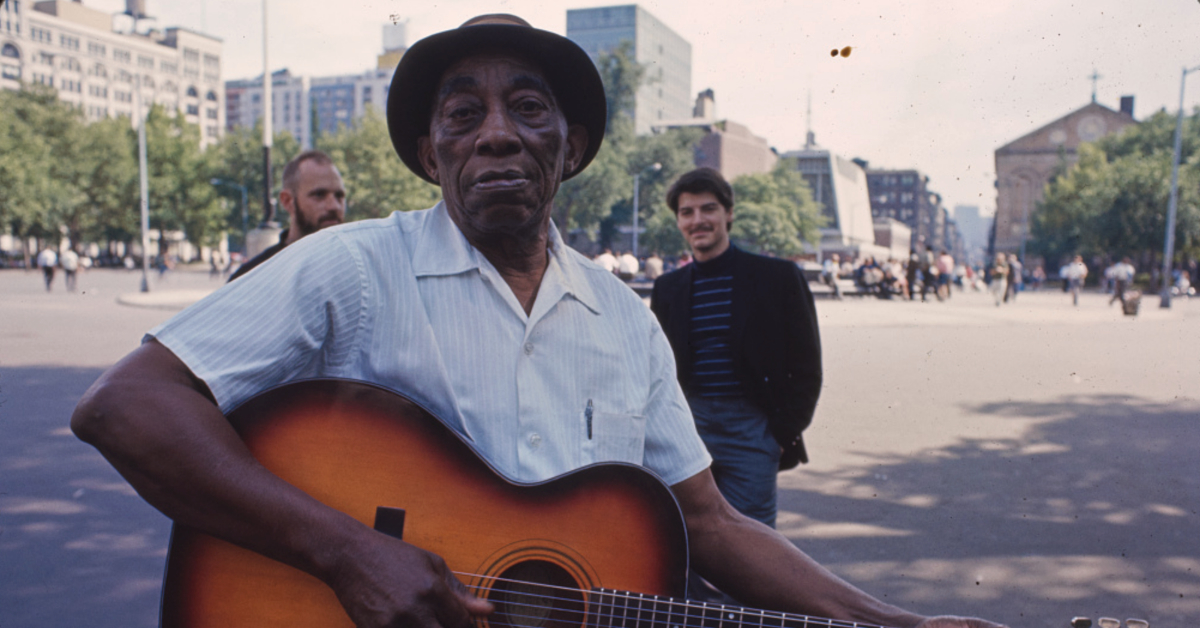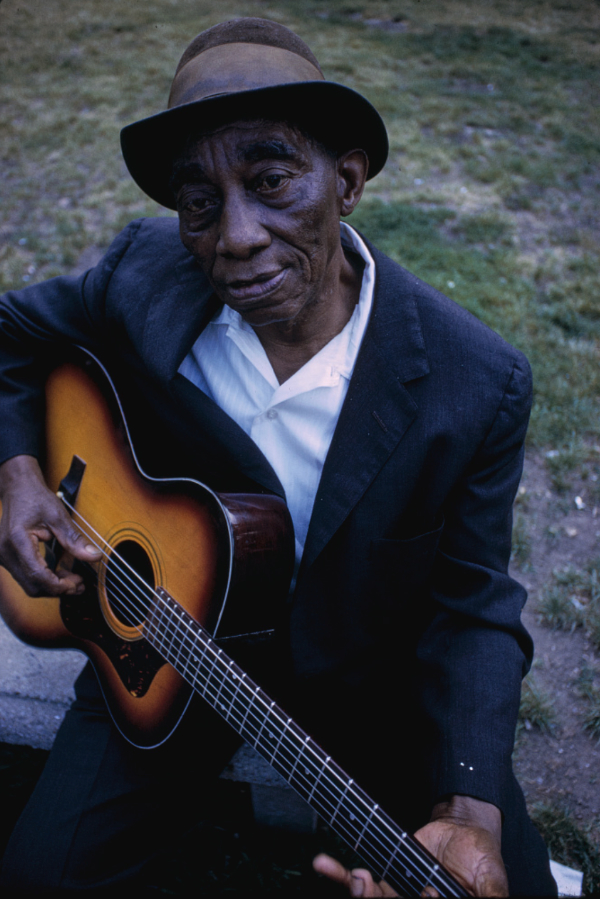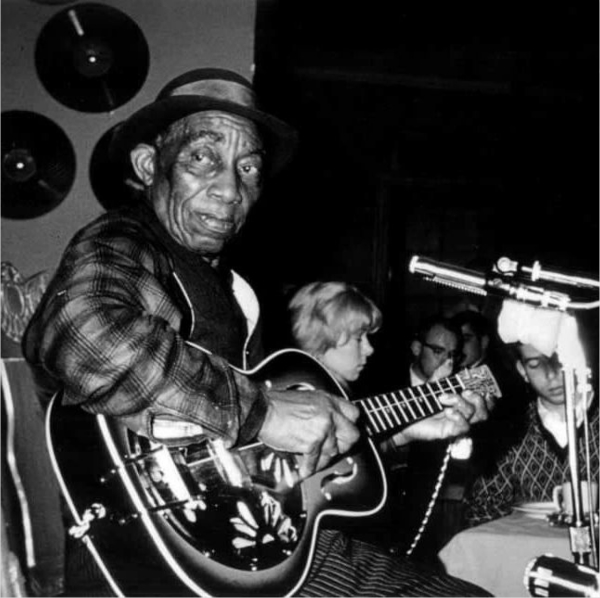
Just a Lovin’ Spoonful: Mississippi John Hurt’s “Coffee Blues”
“Coffee Blues.” Music and lyrics by John S. Hurt. Lyrics © copyright Wynwood Music Co. Inc., Sony/ATV Music Publishing LLC. First recorded in 1963.
Mississippi John Hurt was a beloved country blues musician whose life story is both sad and inspirational. Born dirt-poor in rural Mississippi, he was a self-taught country blues singer and guitarist. After a short burst of modest success in the 1920s, he languished in obscurity for decades before he and his music were rediscovered in the 1960s.
By all accounts, Hurt was an unassuming man whose disarming, gentle style endeared him to audiences. In an essay written for the Library of Congress in 2009, his granddaughter Mary Frances Hurt and musician Ed Levine note that his lyrics “range from the haunting to the hilarious.” But they go on to say:
“As impressive as his lyrics are, Mississippi John Hurt is most regarded for his picking style. John’s ability to combine a distinct base line, played mostly with his thumb, plus a separate and distinct melody make his one guitar sound like two. Still, it is not just the musicianship nor the writing but the whole package that transports us. The easy style of play and turn of phrase, combined with exquisite timing and a voice that makes one wish he was your actual grandad, makes it nearly impossible to hear Mississippi John Hurt’s music without smiling.”
Mississippi John Hurt: Afflicted by the Coffee Blues
Mississippi John Hurt loved his coffee. He loved it so much that he wrote a song about it, the classic “Coffee Blues.” It’s a song that, as much as any other, captures what made Hurt such a great artist and so beloved by his listeners.
In “Coffee Blues,” Mississippi John has the blues because he can’t get his coffee. All he needs is a spoonful. But not just any brand of coffee will do. It’s got to be Maxwell House coffee. Just a spoonful of the “good to the last drop” coffee will do him as much good as two or three cups of “this other coffee” he’s got now.
But what he’s really troubled by in “Coffee Blues” are the “lovin’ blues.” His girl moved away—some people said she went to Memphis and some said to Leland (Mississippi). He needs to find her, so she can give him the “lovin’ spoonful” he misses so much. Even though he can get other brands of lovin’, he’d rather have just a spoonful from his baby.
If he can get her back, life will be good again. He imagines being with her in the morning: “Good mornin’, baby, how you do this mornin’? / Well, please, ma’am, just a lovin’ spoon, just a lovin’ spoonful …”
A Modest Early Start, Then Decades of Obscurity
John Smith Hurt was born in 1892 or 1893 in rural Teoc, Mississippi, in the Mississippi Delta, and raised in nearby Avalon. He began teaching himself how to play the guitar when he was eight years old. As he got older, he performed for local audiences while working as a sharecropper picking cotton and also working part-time on the railroad.
Hurt made some records for the OKeh label in 1928, recording eight songs in Memphis in February and twelve more in New York City in December. Although he may have already written “Coffee Blues” by that point, it was not one of the songs that OKeh released.
Hurt said later that he was paid only $20 per song and his contract did not include royalties. In any event, record sales fell when the Depression hit, and Hurt got no more recording opportunities. His professional music career was cut short.

Mississippi John Hurt, blues singer, in NYC. Photograph by Bernard Gotfryd, 1965. Public domain, via the Library of Congress.
Back in Avalon, Hurt eked out a living by sharecropping, doing odd jobs, and tending cows. He played music locally at some small clubs and parties over the next several decades. But he was so far from the limelight that music fans, if they were aware of him at all, assumed he was dead.
Rediscovery and "Overnight" Success in the 1960s
In 1963, musicologist and blues enthusiast Tom Hoskins of Arlington, Virginia, decided to see if he could find the old bluesman. He had heard some of Hurt’s OKeh recordings from 1928, which intrigued him. Noting that Hurt’s song “Avalon Blues” contained the line “Avalon my hometown, always on my mind,” Hoskins located the tiny rural Mississippi town in an atlas and went looking for him. He found him living on a tenant farm.
After asking him to play a few songs to make sure he had the right man, Hoskins persuaded him to move to Washington, D.C., and perform for larger audiences. As entertainment columnist Will Jones reported in his “After Last Night” column in the Minneapolis Star Tribune on January 24, 1964, Hurt was convinced that Hoskins was really an FBI man. “I knew I hadn’t done anything sinful,” he said, “but I went along any way. Now I’m sorry the FBI man didn’t discover me a few years earlier.”

Mississippi John Hurt performing at Ontario Place coffee house in Washington D.C., December 31, 1963. (Photo by Hank O'Neal, via historyofbluesmusic on Instagram)
When he moved to Washington, D.C., Hurt became an immediate success as a performer. He had regular gigs at the Ontario Place coffee house from 1963 to 1965. Audiences loved him, and so did other musicians.
He also resumed recording for the first time since 1928. He recorded an album for the Piedmont label, Mississippi John Hurt: Folk Songs and Blues. In July 1963, he recorded more than two dozen songs at the Library of Congress. These recordings were not released to the public until the 1980s, but they included his first known recording of “Coffee Blues.”
Hurt then traveled to Newport, Rhode Island, for the 1963 Newport Folk Festival. The Festival brought together numerous folk, bluegrass, country, and blues musicians for three days of concerts and music workshops from July 26 to July 28. The impressive array of artists included Bob Dylan (also making his first Newport appearance), Joan Baez, Ramblin’ Jack Elliott, John Hammond, John Lee Hooker, and many others.
Hurt’s performance at Newport brought him many new fans. Four songs from his set at the Sunday evening concert, including “Coffee Blues,” were included on a popular Vanguard album released in September 1963, The Newport Folk Festival—1963: The Evening Concerts: Vol. 1. This live version of “Coffee Blues” was the first commercial release of the song.
After Newport, Hurt was in demand on the college and coffeehouse concert circuit and was invited to perform at various music festivals throughout North America. His festival appearances included the 1963 Philadelphia Folk Music Festival, the 1964 Berkeley Folk & Music Festival, and the 1964 Mariposa Folk Festival in Ontario. He appeared on The Tonight Show with Johnny Carson. In 1964, he toured the United Kingdom with other blues artists in the American Folk, Blues, and Gospel Caravan, He also returned to Newport for the 1964 and 1965 folk festivals.
In 1964, Hurt recorded a studio album for Vanguard Records that was released in 1966 as Mississippi John Hurt Today! Its 14 tracks include “Coffee Blues.” In his liner notes, music critic Nat Hentoff wrote, “I’m certain Maxwell House Coffee has yet to receive as convincing an unsolicited testimonial as John Hurt’s Coffee Blues.”
Hurt lived to enjoy only a few short years after his re-emergence on the music scene in 1963. In November 1963, he died from a heart attack near his home in Avalon.
Mississippi John Hurt's Legacy—and a Special Tribute to "Coffee Blues"
In the 50 years since Hurt’s death, numerous anthology albums of his songs have been released. Many include the iconic “Coffee Blues,” including a 1996 album, Mississippi John Hurt: Coffee Blues, that takes its title from the song. The Library of Congress added Mississippi John Hurt Today! to the National Recording Registry in 2009.
Mississippi John Hurt influenced musicians in a variety of genres, including blues, country, bluegrass, folk, and rock. Many artists, from Bob Dylan to David Johansen, Jerry Garcia, and Taj Mahal, have covered his songs. In 1999, singer-songwriter Bill Morrissey released an excellent tribute album, Songs of Mississippi John Hurt, that includes a great version of “Coffee Blues.”
And in a different type of tribute, one of the most popular folk-rock bands of the 1960s, The Lovin’ Spoonful, took its name from the lyrics of Hurt’s “Coffee Blues.” John Sebastian, one of the two founding members of the band along with Zal Yanofsky, was a Mississippi John Hurt fan. When a fellow musician suggested the name, Sebastian loved it, and The Lovin’ Spoonful was born. So when the band’s fans listened to The Lovin’ Spoonful, whether they knew it or not, they were also celebrating Mississippi John Hurt and his classic song “Coffee Blues.”
Copyright © Brian Lokker 2014, 2024. An earlier version of this article was published on CoffeeCrossroads.com.
Featured image: Mississippi John Hurt, blues singer, in NYC. Photograph by Bernard Gotfryd, 1965. Public domain, via the Library of Congress. The complete lyrics of “Coffee Blues” are available online at LyricFind.



